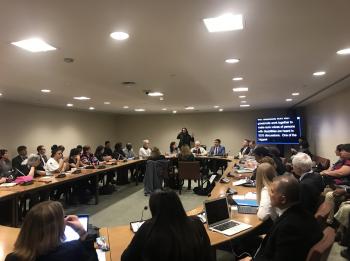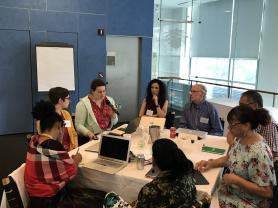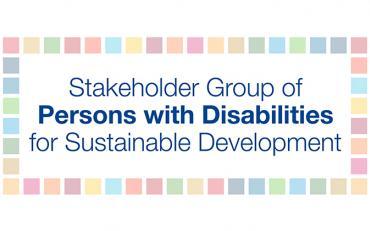- Back to Disability Data Advocacy Working Group page
- Activities for 2019 (Disability Data Advocacy Working Group)
Welcome to our June newsletter! We extend a particular thanks to those who have contributed to this newsletter. We continue to welcome and encourage all of you to contribute to the future newsletters by emailing us at: hlpf2019 [at] ida-secretariat.org.
June 2019
On this page:
- The first six months of the Disability Data Advocacy Working Group in numbers
- Information on disability data webinar series
- Resources
- Updates
- Marketplace
1. The first six months of the Disability Data Advocacy Working Group in numbers
In January 2019, the Stakeholder Group of Persons with Disabilities launched its Disability Data Advocacy Working Group with the objective to provide a platform for information sharing, learning, dialogue, good practices and collaboration on disability data collection, disaggregation, research and analysis.
Over the past six months, the Stakeholder Group of Persons with Disabilities’ Disability Data Advocacy Working Group has undertaken a number of successful activities. Since the launch of the Working Group, the following has been accomplished:
-
Four disability data webinars have been hosted by the Stakeholder Group of Persons with Disabilities. A summary of the webinars in numbers is as follows:
- January webinar - “Collecting data on persons with disabilities in humanitarian action” - 413 people registered, 116 people attended, 86 people watched the recording after
- February webinar - “Practical guidance on gathering and analyzing disability data” - 228 people registered, 87 people attended, 55 people watched the recording after
-
March webinar - “Country experiences in disability data collection” - 149 people registered, 62 people attended, 25 people watched the recording after
-
May webinar - “Gathering data on children with disabilities and learning about administrative data” - 160 people registered, 69 people attended, 36 people watched the recording after
- Four newsletters have been issued, in January, February, April and June, to provide new and relevant information on disability data and to serve as a practical resource. The newsletters contain the following sections:
- Information on the disability data webinar series
- A main article related to disability data
- Blogs
- Updates and news
- Resources
- Marketplace
- A standalone listserv where there is an active and ongoing dialogue about disability data. 206 people are subscribed to the listserv.
In addition to the activities undertaken by the Disability Data Advocacy Working Group, the Working Group has been presented as a best practice at many conferences, including the 9th IAEG-SDGs Meeting in Beirut, the United Nations Statistical Commission in New York, the Commission on the Status of Women (CSW) in New York and the Conference of States Parties to the Convention on the Rights of Persons with Disabilities in New York.
2. Information on disability data webinar series
The Stakeholder Group of Persons with Disabilities held its fourth webinar of its series on the 22nd of May on gathering data on children with disabilities and learning about administrative data. If you were unable to join us, click here for a recording of the webinar. Additionally, presentations can be found below:
- UNICEF/WG child module - Claudia Cappa, UNICEF
- Use of disability data in administrative systems in Education Management Information Systems that is emerging - Daniel Mont
The next disability data webinar will be held in September. Details are forthcoming.
3. Resources
Leave No One Behind Partnership
The International Civil Society Centre hosts the Leave No One Behind partnership. The partnership is made up of 12 international civil society organizations, including CBM, and strategic partners at the national and sub-national level with the goal to create more inclusive SDG implementation. Specifically, the objective is to gain recognition of community-driven data in SDG monitoring in national and international policy decision making and to influence national policies, particularly for marginalized groups, including persons with disabilities, older persons, youth, women and girls, ethnic minorities, transgender people, street dwellers, and more.
The partnership launched its pilot project in September 2017 until February 2019 in five countries: Bangladesh, India, and Kenya, Nepal, and Vietnam. Each country identified data gaps and collected data on the most marginalized groups. Data on the situation of persons with disabilities was collected in each country, and for example, in India, DPOs led and collected the collection of disability data.
A compelling outcome is that most data comes from national averages (from surveys) and the project addresses this gap by gathering data from marginalized groups that are often left out. As next steps, the results from the pilot will be used to scale up the approach internationally with the aim of implementing the project in 20 countries by 2022. For more information on the partnership click here and/or contact Dr. Elizabeth Lockwood at elizabeth.lockwood [at] cbm.org.
4. Updates
 Update #1: Side Event at the Conference of States Parties to the CRPD - “Including the furthest left behind: Disability Data Advocacy Working Group”
Update #1: Side Event at the Conference of States Parties to the CRPD - “Including the furthest left behind: Disability Data Advocacy Working Group”
The Stakeholder Group of Persons with Disabilities, in collaboration with the Permanent Missions of Australia, Italy and the Republic of Zambia to the United Nations, the International Disability Alliance, CBM, Disabled Peoples’ International, World Blind Union, UN Statistics Division and the Washington Group on Disability Statistics organized a side event at the Conference of States Parties to the CRPD titled “Including the furthest left behind: Disability Data Advocacy Working Group.”
This side event was organized in a non-traditional format starting with a brief introduction to the Disability Data Advocacy Working Group, followed by an open, interactive dialogue on disability data and focus on how the Disability Data Advocacy Working Group can contribute to scaling up efforts at the national level on collection and disaggregation of disability data.
Participants were invited to:
- Share information regarding the current situation on disability data at the national level;
- Discuss programs, advocacy strategies, lessons learned, challenges and best practices on disability data and on how to reach and include persons with disabilities in data collection;
- Highlight any good practices when data was used to influence policies and/or budget changes for persons with disabilities;
- Share any good practices on alternate data sources that include data on persons with disabilities; and
- Recommend strategies for galvanizing donors and national statistical offices to collect data on persons with disabilities.
One main outcome is that DPO engagement in data collection and disaggregation efforts is critical yet missing. Findings indicate that DPOs are ready to engage, but need technical support, advocacy guidance, and the opportunity for periodic information exchange and learning.
 Update #2: Workshop on the Measurement of Disability for DPOs
Update #2: Workshop on the Measurement of Disability for DPOs
On Friday, June 14th, UNICEF, in collaboration with the Washington Group on Statistics, Stakeholder Group of Persons with Disabilities, International Disability Alliance and CBM, organized a full-day disability data training on the margins of the Conference of States Parties to the Convention on the Rights of Persons with Disabilities.
The workshop was enriched through presentations on models and methods for collecting disability data, data availability and measurement challenges, and data production and analysis using the Washington Group tools. Moreover, participants were able to share information and learn from each other through interactive discussions about the importance of disability statistics in the context of the CRPD and SDGs, interpreting and using data on persons with disabilities, policy making through data, and country examples. Read the CBM blog for details on the workshop.
5. Marketplace
- ENGAGE! To stay up to date and engage in the most recent dialogues surrounding disability data, please join our Disability Data Forum ListServ here.
- INFORMATION! Find more information regarding the activities of the Disability Data Advocacy Working Group here.
- ENGAGE! To input into future disability data newsletters, please email hlpf2019 [at] ida-secretariat.org () with your submissions.

